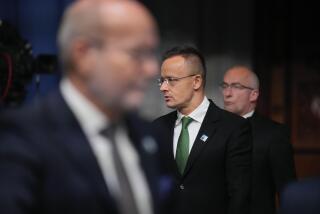Allies to Freeze Yugoslav Accounts Over Kosovo Violence
ROME — The United States and four European allies agreed Wednesday to freeze Yugoslav government funds in their banks to try to force President Slobodan Milosevic to end a growing assault on Albanian separatists in Kosovo province.
The allies also held out incentives, offering to usher Milosevic’s pariah nation into the United Nations, World Bank and other international bodies if he withdraws military forces from the embattled region and opens substantive peace talks with the rebels.
The decision by the Contact Group, the six-nation body that monitors conflicts in the Balkans, was meant to increase pressure on Milosevic to end two months of fighting that has left more than 100 people dead.
But the freeze’s effect was far from certain. The diplomats who announced it were unsure how much financial pain it will inflict. Even its symbolic importance was limited by the refusal of Russia, the sixth member of the group, to endorse it.
Still, U.S. diplomats welcomed the outcome of the 13-hour meeting, relieved that chronic divisions within the group did not paralyze it this time. Its final communique, said a senior State Department official, “is a clear message to Milosevic of the [group’s] willingness . . . to do real damage to the Serb economy while holding out the promise of improved relations.”
Milosevic, whose rump Yugoslavia is made up of Serbia and Montenegro, has shown a willingness before to put his people through economic hardship wrought by international sanctions rather than back down in Kosovo, which many Serbs consider the cradle of Serbian civilization.
Just last week, he staged a defiant, nationwide referendum marked by crude anti-Western propaganda to win voter rejection of any foreign role in ending the bloodshed in Kosovo, where leaders of a 2-million-member ethnic Albanian majority are demanding self-rule.
Still, a message issued here by diplomats from the U.S., Britain, Italy, France, Germany and Russia insisted for the second time in two months that Milosevic accept a peace mission led by former Spanish Prime Minister Felipe Gonzalez.
The group has already banned arms deliveries and government trade credits to Yugoslavia. Its Western members have been threatening to freeze Yugoslavia’s foreign funds since March 9, shortly after the conflict erupted, to press Milosevic to accept an outside mediator. But splits in the group, which last met in Bonn a month ago, have let that deadline slip three times.
What finally prompted the group to act, according to participants in the Rome meeting, was disgust over Milosevic’s referendum--one diplomat called it “an obvious provocation”--and a sharp escalation of what had been limited fighting between Serbian paramilitary police and several hundred separatist guerrillas.
The Yugoslav army has moved artillery and antiaircraft weapons into the mountainous province in recent days and killed many guerrillas reportedly bringing grenades, mortars and automatic weapons into Kosovo from Albania. The army has threatened to invade Albania, whose government denies aiding the guerrillas.
On Monday, the army killed three more Albanians near the border. During their funeral Wednesday, Serbian police opened fire on mourners, killing a 26-year-old Albanian man, according to news reports from Kosovo. Serbian authorities said the dead man was a guerrilla who shot first.
The communique said the fund freeze would be reversed as soon as Milosevic agrees to a framework for peace talks and withdraws troops from Kosovo. But group members--all but Russia--threatened to take action in 10 days to block new investment projects in Serbia if Milosevic blocks peace efforts.
Participants in the meeting said Germany and Britain joined the United States in pressing for the freeze and that France and Italy, which had initially opposed it, went along--in part to head off a U.S. threat to quit the group.
U.S. officials say Yugoslavia has tens or perhaps hundreds of millions of dollars in foreign accounts. But newspapers in Belgrade say the government has been calling its money home.
The freeze cannot take effect until individual countries enact the group’s decision into law.
Robert Gelbard, the chief U.S. mediator for the Balkans, said the action would tighten the screws on Yugoslavia’s already impoverished economy. But a German diplomat said: “It’s hard to say what the precise weight of these sanctions will be. . . . What’s more important is that we showed Milosevic that we’re serious.”
Times staff writer Norman Kempster in Washington contributed to this report.
More to Read
Sign up for Essential California
The most important California stories and recommendations in your inbox every morning.
You may occasionally receive promotional content from the Los Angeles Times.










